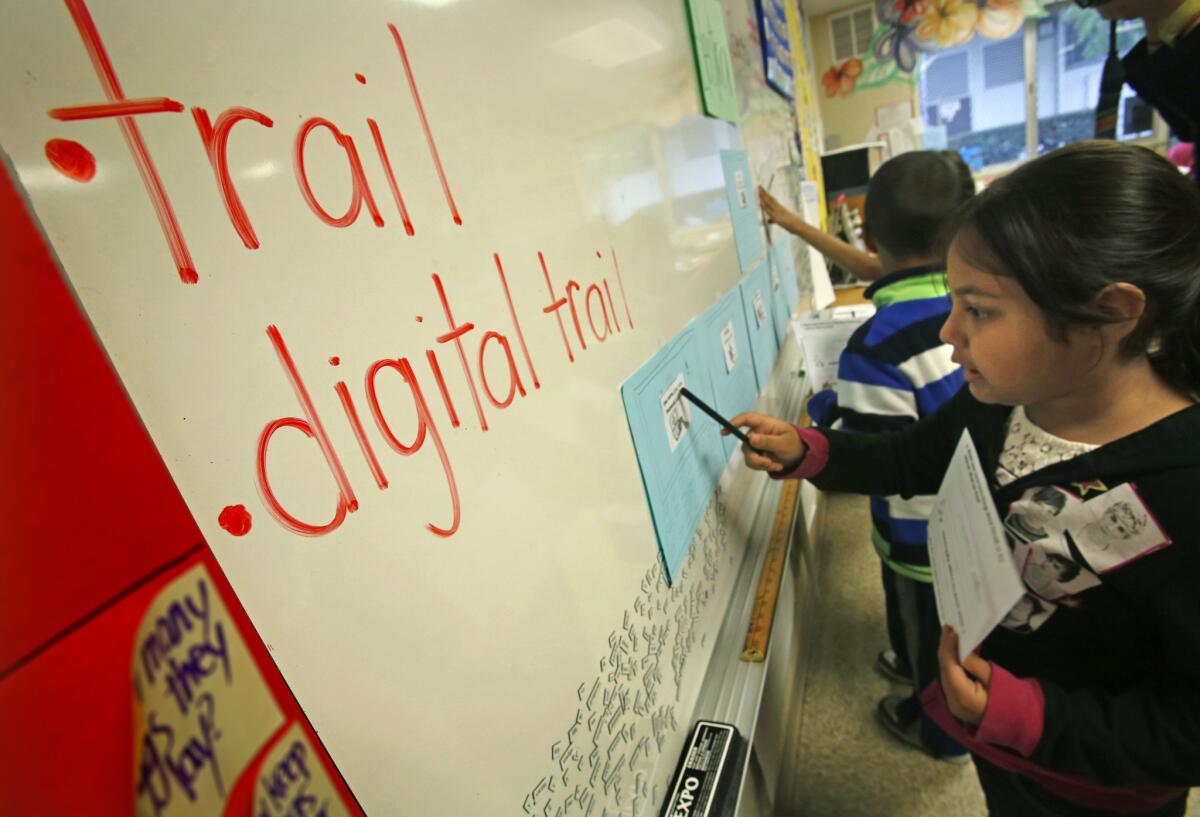L.A. students learn to use their (future) iPads safely

- Share via
Erin Takeuchi’s first-grade classroom at San Pascual Avenue Elementary is well outfitted.
Every student work station has a box with glue, pencils, crayons and safety scissors. The walls are a riot of student work, academic content and inspirational messages.
But one item is curiously absent — the iPads that Los Angeles school officials have wanted to distribute to every student.
This made Takeuchi’s activity on Friday especially noteworthy. She was teaching students how to use iPads safely.
“Can you say ‘digital trail’?” Takeuchi began.
Critics have accused the L.A. Unified School District of making mistakes, squandering dollars and rushing ill-advisedly into the digital future as it has tried to provide a computer for every student, teacher and school administrator in a $1-billion effort.
San Pasqual in Highland Park is an example of advance planning. Students at this school won’t get their iPads until the fall. In the meantime, their task is to become ethical and wary digital citizens.
This districtwide initiative arrived too late to prevent students at three high schools last fall from deleting security filters so they could surf the Internet freely. After that the district abruptly stopped letting students take home the devices, a decision officials intend to reverse.
In preparation for that day, Takeuchi deployed her students on a detective mission to uncover the digital footprint left behind by Mizzle the Mouse and Electra the Elephant. Because Takeuchi lacks computers, she distributed this information around the room on blue sheets taped to the wall. Each has a drawing of a computer with information written on the “screen.”
In the lesson, Electra has posted her exact address and birthdate online and allowed others to know both her user name (gray_toes) and password (bamboo).
Should strangers learn your user name and password? Takeuchi asked.
The class responded with a long, horrified: “Nooooooooo!”
“Maybe somebody bad could find out your birthday and come to your birthday and steal you,” Yvette Fuentes reasoned.
The elephant also had blabbed that she fights with her brother all the time.
“Do you think Electra’s brother would feel happy about that?” Takeuchi asked.
There also was the matter of Electra’s profile photo, in which she sported a bikini.
“Scandalous,” intoned Takeuchi. “Don’t ever do that .… No picture like that, OK?”
The mouse, in contrast, selected a photo of cheese for his profile.
Much safer, said Takeuchi, although student Mariah Leal offered that, “They would think he looks like a cheese.”
Speaking of cheesy, a schoolwide assembly on the topic had its provoloney moments, like the customized chant from the cheer team.
“Two, four, six, eight, what do we appreciate? Digtal citizenship week!” shouted the 17-member group, following it up with high kicks.
Other students brought out handwritten posters with messages such as: “We will communicate responsibly and kindly.”
Students also read pledges:
“We will report cyberbullying.”
“We will keep our own and others’ information private.”
“We will not post anything that will harm or embarrass our friends or ourselves.”
“We will give proper credit when we use others’ work.”
Said principal Victor J. Taglianetti: “With such a powerful tool for learning comes a lot of responsibility.”
ALSO:
Man accused of running over wife’s Chihuahua is charged
Riverside teachers put on leave amid third-grader sex scandal
Sheriff candidates support dropping agency’s current civilian monitors
Twitter: @howardblume
More to Read
Sign up for Essential California
The most important California stories and recommendations in your inbox every morning.
You may occasionally receive promotional content from the Los Angeles Times.














